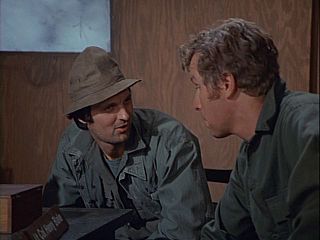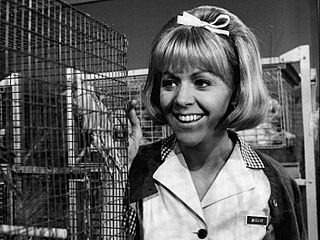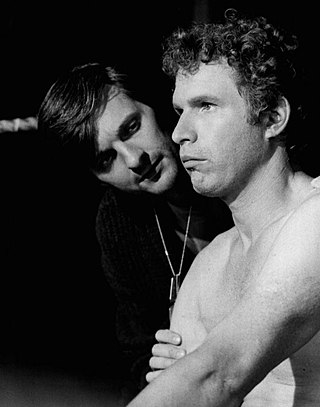Related Research Articles

M*A*S*H is an American war comedy drama television series that aired on CBS from September 17, 1972, to February 28, 1983. It was developed by Larry Gelbart as the first original spin-off series adapted from the 1970 feature film M*A*S*H, which, in turn, was based on Richard Hooker's 1968 novel MASH: A Novel About Three Army Doctors. The series, produced by 20th Century Fox Television for CBS, follows a team of doctors and support staff stationed at the "4077th Mobile Army Surgical Hospital" in Uijeongbu, South Korea, during the Korean War (1950–53).

Marcia Ann Strassman was an American actress and singer. She had roles on the TV programs Welcome Back, Kotter and M*A*S*H, as well as in the film Honey, I Shrunk the Kids.

The pilot episode of M*A*S*H, the first episode of the first season was broadcast on September 17, 1972, although the initial script was first written in November 1971. The episode was written by Larry Gelbart and directed by Gene Reynolds, who received the Directors Guild of America Award for it. It was also nominated for two Emmys for its direction and writing.
"The Moose" is an episode of the television series M*A*S*H. It was the fifth episode broadcast and aired on October 15, 1972, and repeated May 27, 1973. It was written by Laurence Marks and directed by Hy Averback.
"Yankee Doodle Doctor" is an episode of the television series M*A*S*H. It was the sixth episode broadcast and aired on October 22, 1972, and it was rerun April 8, 1973. It was written by Laurence Marks and directed by Lee Philips.
"Bananas, Crackers and Nuts" is an episode from M*A*S*H. It was the seventh episode broadcast and aired on November 5, 1972 and repeated April 22, 1973. It was written by Burt Styler and directed by Bruce Bilson.

Arlene Leanore Golonka was an American actress. She is perhaps best known for playing Millie Hutchins on the television comedy The Andy Griffith Show and Millie Swanson on Mayberry R.F.D., and often portrayed bubbly, eccentric blondes in supporting character roles on stage, film, and television.
"Cowboy" was the eighth episode of the M*A*S*H television series. Originally shown on November 12, 1972 and repeated May 6, 1973, it was written by Bob Klane and directed by Don Weis. It is the only first-season episode listed in TV Guide as a "classic episode".
"Henry Please Come Home" was the ninth episode of the first season of the TV series M*A*S*H. It originally aired on November 19, 1972. It was written by Laurence Marks and was directed by William Wiard.
"The Ringbanger" was the 16th episode of the first season of the TV series M*A*S*H. It originally aired on January 21, 1973.
"Sometimes You Hear the Bullet" is the 17th episode of the first season of the TV series M*A*S*H, originally airing on January 28, 1973. This is the first episode in which the medical staff failed to save a wounded soldier, and one of the first episodes of the series showing a member of the hospital staff truly affected by death.
"Dear Dad...Again" is the 18th episode of the first season of the American television series M*A*S*H. It originally aired on February 4, 1973.
"Major Fred C. Dobbs" is the 22nd episode of the first season of the TV series M*A*S*H. It originally aired on March 11, 1973.
"To Market, to Market" is the second episode of M*A*S*H. It was first aired on September 24, 1972 and repeated on April 29, 1973. Like many other M*A*S*H episodes, this one parodies army bureaucracy.

Howard Sprague is a fictional character on the CBS television sitcom The Andy Griffith Show, and its spin-off Mayberry R.F.D.. He was played by Jack Dodson from 1966 to 1971.
"5 O'Clock Charlie" was the 26th episode of the M*A*S*H television series, and second of season two. The episode aired on September 22, 1973.
"Radar's Report" was the 27th episode of M*A*S*H, and third of season two. The episode aired on September 29, 1973.

"Requiem for a Lightweight" is the third episode of the television series M*A*S*H. It was first aired on October 1, 1972 and was repeated on December 31, 1972, the first episode of M*A*S*H to do so. In Watching M*A*S*H, Watching America, a sociological examination of M*A*S*H as an illustration of shifting American values in the 1970s and early 1980s, James H. Wittebols cites this episode as an example of the sexual humor which was common in early M*A*S*H episodes, but downplayed later in the program's history.
References
- ↑ Wittebols, James H. (2003). Watching M*A*S*H, Watching America. Jefferson, North Carolina: McFarland. pp. 161–166. ISBN 0-7864-1701-3 . Retrieved May 15, 2009.
- ↑ "Episode Guide". TV Guide. Retrieved May 15, 2009.
- ↑ "The Classic Sitcoms Guide: M*A*S*H". classicsitcoms.com. Archived from the original on July 23, 2011. Retrieved May 15, 2009.
- ↑ "M*A*S*H: Season One (Collector's Edition) (1972)". Digitallyobsessed.com. Archived from the original on June 13, 2011. Retrieved May 17, 2009.
- ↑ Reiss, David S. (1983). M*A*S*H: the exclusive, inside story of TV's most popular show.